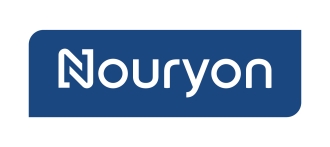
Stronger Communities
Nouryon

Seeking sustainable innovation in specialty chemicals
Nouryon is a global specialty chemicals leader. Markets and consumers worldwide rely on their solutions to manufacture everyday products, such as personal care, cleaning goods, paints and coatings, agriculture and food, pharmaceuticals, and building products. The global company’s customer-centric business model provides tailored solutions designed to improve the performance, quality, and sustainability of its customers’ products, which comprise essential items for millions of consumers.
Given the scale, necessity, and carbon-intensive nature of some of the end markets that specialty chemicals companies supply, we believe making the industry more sustainable is integral to a lower-carbon future. Accordingly, Nouryon’s growth strategy looks to provide customers sustainable specialty chemicals solutions that address their specific use cases. To further incentivize progress and accountability internally, the company has set robust, time-bound targets to improve environmental performance and will continue to challenge itself to reduce environmental impacts, mitigate risks, and harness growth at the forefront of sustainable innovation. In addition to its aspiration to be a net zero organization by 2050, Nouryon targets a 40% reduction in its absolute Scope 1 and 2 greenhouse gas (GHG) emissions by 2030 from a 2019 base year. By the end of 2030, the company also seeks to reduce its total waste intensity and freshwater consumption intensity by 10% from a 2019 base year.
To meet their GHG goals, Nouryon developed a carbon business strategy with a long-term horizon and clear oversight. In 2022, the company established a GHG emissions roadmap with tangible actions across four key areas, detailed below. In order to help develop and accelerate the strategy, the Carlyle ESG team participated as part of the decarbonization strategy session.
Energy Transition: Renewable energy plays a key role in reducing Nouryon’s emissions and creating a clear path to its 2030 goals. Nouryon was fortunate to start its decarbonization journey from a strong position in renewable energy in Sweden and Brazil. Building on this, recent on-site renewable electricity projects and agreements in Guangzhou, China, Mons, Belgium, and a planned project in Morris, Illinois are achievements that are creating momentum for Nouryon.
Innovation: With 77% of Nouryon’s R&D product pipeline focused on sustainability benefits, the company continues to innovate to provide products that help customers achieve their sustainability needs. For example, using Nouryon’s Expancel® microspheres to make packaging lighter drives transportation fuel efficiency and reduces transportation-related emissions. Similarly, the company’s solutions are important for renewable energy-related products such as lightweight composite parts in wind turbines and insulation for high-quality, high-voltage cables; they also help make solar panels more durable and efficient.
Carbon Operational Excellence: Nouryon is working to improve its operational efficiency and optimize its fuel mix. For example, the company has partnered with Adven in Kvarntorp, Sweden, to source steam produced from renewable wood pellets instead of on-site fossil fuels. Similarly, five manufacturing sites in Brazil that the company operates are carbon neutral in Scope 1 and Scope 2 through customer partnerships and a unique, integrated manufacturing model.
Value Chain Collaboration: Through supplier and customer partnerships, Nouryon plans to reduce indirect GHG emissions across its value chain and is currently evaluating lower-carbon raw materials suppliers and raw materials. In 2023, Nouryon announced it has joined Together for Sustainability (TfS), a global initiative of companies committed to raising sustainability standards throughout the chemical industry. In addition, Nouryon is meeting a growing demand from customers for product life cycle assessment (LCA) data—for example, product carbon footprints that can be used to help assess potential reduction opportunities.
This work is starting to drive results. Between 2019 and 2022, the company reduced its absolute Scope 1 and 2 GHG emissions by 1.3% while growing revenue. In 2022, the company sourced 34% of its energy from renewable sources such as hydro, wind, solar, biomass for power, and waste biomass steam.
Nouryon has been widely recognized for its work in sustainable chemistry. Nouryon achieved a Platinum EcoVadis rating1 for its sustainability performance in 2022, placing Nouryon in the top 1% of companies then rated by the global sustainability ratings provider.
Also, the American Chemistry Council honored Nouryon’s Agrilan® 1015 biodegradable liquid dispersant with its 2022 Sustainability Leadership Award for Product Safety, Innovation, and Transparency2 2, recognizing its value to growers globally seeking more sustainable ways to protect their crops. Growers use this multipurpose, nonpersistent, biodegradable solution for aqueous crop protection and seed-treatment applications to help active ingredients dissolve more easily and enhance formulations. In addition, the dispersant does not contain risk or classified ingredients and is a nonendocrine disruptor.
Looking ahead, Nouryon aims to continue to prioritize value creation through its sustainability goals and innovate along the carbon business strategy’s four themes, accelerating the specialty chemicals sector toward a more sustainable future.
Integrated Manufacturing Model
Nouryon’s Integrated Manufacturing Model (IMM) helps deliver solutions that bleach pulp as raw material for tissue products directly to its customers’ sites in Brazil. The company receives electricity from its customers generated from renewable biomass (eucalyptus) fuel. It uses this electricity in its electrochemical processes for making bleaching products. This on-site production eliminates the need for transport, helping to reduce transportation-related emissions. In 2021, five of these sites achieved carbon neutrality in Scopes 1 and 2. Nouryon also signed a long-term supply agreement with Suzano, a leading global eucalyptus pulp producer, for a new IMM in Mato Grosso do Sul, Brazil. Details about the partnership, which comprises one of the largest private sector investments currently under development in Brazil, can be found in Nouryon’s most recent sustainability report.
Data shown has been provided directly by the portfolio company and has not been independently verified. There is no guarantee that the portfolio company will successfully implement its business plan or meet stated commercial or ESG targets. There can be no assurance that any trends described herein will continue. Past performance is not indicative of future results.
All data has been provided directly by the relevant portfolio company and has not been verified by Carlyle or any third party. References to a particular portfolio company should not be considered a recommendation of any particular security, investment, or portfolio company. The information provided about the portfolio company is intended to be illustrative, and is not intended to be used as an indication of the current or future performance of this or any of Carlyle’s portfolio companies. ESG goals, targets and commitments are not binding on investment decisions and/or Carlyle’s management of investments (unless otherwise specified, where applicable, in fund documentation or regulatory disclosures) and any reference herein to environmental, social or governance considerations is not intended to qualify our duty to maximize risk adjusted returns. There is no guarantee that any ESG target or related projection will be met, that any ESG activities will be implemented to the same degree for other Carlyle investments or that they will create a positive ESG or financial impact. Descriptions of any ESG or impact achievements or improved practices or outcomes are not necessarily intended to indicate that Carlyle has substantially contributed to such achievements, practices, or outcomes. For instance, Carlyle’s ESG efforts may have been one of many factors—including such other factors as engagement by portfolio company management, advisors, and other third parties— contributing to the success described in each of the selected case studies. The information provided in these case studies is for informational purposes only and may not be relied on in any manner as advice or as an offer to sell or a solicitation of an offer to buy interests in any fund or other product sponsored or managed by Carlyle or its affiliates.
1 Such rankings are based on methodology and criteria created by EcoVadis or the American Chemistry Counsel (as applicable), which are not known to Carlyle.
2 Source: Suzano, Nouryon https://www.suzano.com.br/en/suzano-to-invest-2-8-billion-in-the-first-fossil-free-pulp-plant-in-brazil/#:~:text=The%20